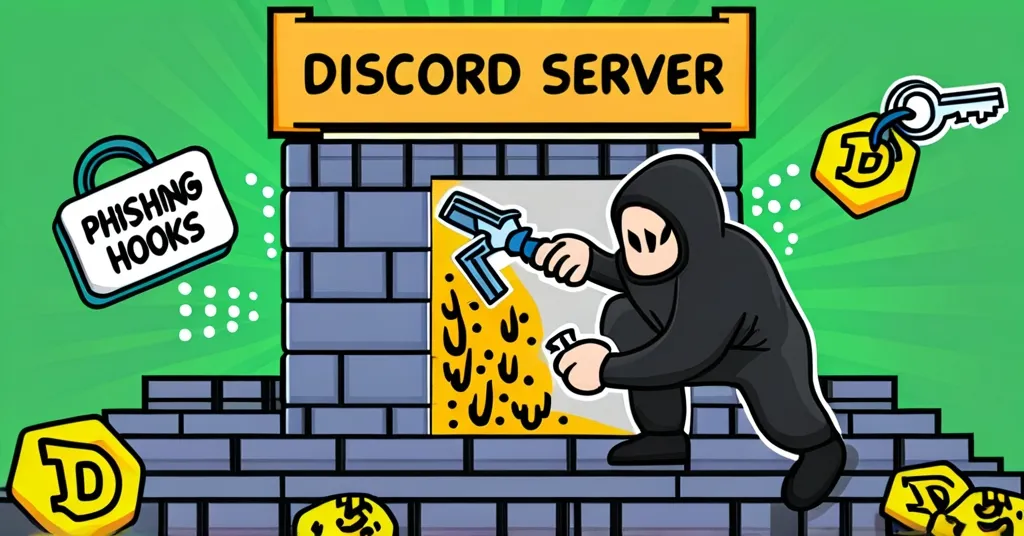Virtuals Protocol Discord Hack Exposes Crypto Security Flaws: Phishing and Private Key Risks

Virtuals Protocol Discord Server Hacked: A Closer Look at Crypto Security Challenges
The Virtuals Protocol, an AI-driven platform, recently experienced a significant security breach when its Discord server was compromised. The hack, which stemmed from a moderator’s private key being compromised, led to the spread of phishing links on Google Search. This incident comes shortly after Virtuals fixed a critical smart contract vulnerability, highlighting ongoing security challenges within the crypto industry. Despite a decrease in overall hacking losses from 2022 to 2024, phishing scams and private key breaches alone resulted in over $1.8 billion in losses last year.
- Discord server hack via compromised moderator key
- Phishing links on Google Search post-breach
- Recent fix of a critical smart contract vulnerability
- 2024 sees over $1 billion in phishing scam losses
- Private key breaches cause $855 million in losses
The Virtuals Protocol’s Discord server was breached after a private key belonging to one of its moderators was compromised. This allowed hackers to gain unauthorized access and spread phishing links impersonating the Virtuals website across Google Search. Cybersecurity firm Scam Sniffer quickly identified these malicious links, warning users to avoid them and verify official URLs before clicking.
Just weeks before this incident, Virtuals had addressed a critical vulnerability in its smart contract, identified by security researcher @lj1nu. This flaw was related to the predictability of token addresses and potential transaction reverts, posing significant risks if exploited. The Virtuals team confirmed, “The breach occurred after a private key belonging to one of the Discord moderators was compromised.”
The broader context of this hack underscores the persistent threat of phishing scams and private key breaches within the cryptocurrency industry. According to CertiK’s 2024 Web3 Security Report, phishing scams led to over $1 billion in losses across 296 incidents, while private key compromises ranked as the second-largest threat, causing $855 million in losses across 65 incidents. Despite a 52% decrease in overall hacking losses from 2022 to 2024, the sector saw a 40% increase in losses from 2023 to 2024.
A notable example of a phishing scam in 2024 involved a trader losing $68 million to an address-poisoning scam, where attackers send small amounts of cryptocurrency to a victim’s address to trick them into sending larger amounts to a similar-looking address. Remarkably, the attacker returned the funds after 10 days, likely due to pressure from security firms. This incident serves as a reminder that swift action and community vigilance can mitigate significant losses.
While the Virtuals Protocol breach is a setback, it also showcases the platform’s commitment to addressing security concerns. The recent smart contract fix demonstrates the ongoing efforts to enhance security within the crypto space. As the industry evolves, platforms like Virtuals must remain vigilant against both known and emerging threats, particularly with the potential evolution of phishing tactics influenced by advancements in AI, as cautioned by CertiK for 2025.
The crypto industry’s integration into traditional finance has seen significant milestones, such as the SEC’s approval of spot Bitcoin and Ethereum ETFs and Bitcoin surpassing $100,000 in value post the U.S. presidential election. The re-election of Donald Trump and his administration’s pro-crypto stance, including appointing Paul Atkins to lead the SEC and Elon Musk to head the “Department of Government Efficiency,” have driven positive momentum for the industry. These developments underscore the need for robust security measures to maintain investor confidence and protect the integrity of decentralized technologies.
In the spirit of effective accelerationism and disrupting the status quo, incidents like the Virtuals Protocol hack serve as a call to action for the crypto community. While Bitcoin remains the cornerstone of the decentralized financial revolution, altcoins and other innovative protocols, like Ethereum, also play vital roles in addressing specific niches and advancing the technology. By embracing a balanced approach to security, education, and innovation, we can continue to drive the adoption of cryptocurrencies and build a more resilient and inclusive financial future.
It’s crucial for crypto enthusiasts to understand terms like “address-poisoning scam,” where attackers send small amounts of cryptocurrency to trick victims into sending more to a similar-looking address, and “private key compromise,” where unauthorized access is gained to the cryptographic key used to control a wallet. Educating ourselves on these concepts empowers us to better protect our assets and contribute to a more secure ecosystem.
As we look to the future, the potential evolution of phishing tactics due to AI advancements necessitates continuous vigilance and the adoption of decentralized security solutions. Experts like David Holtzman and cybersecurity firm Cyvers emphasize the vulnerability of centralized systems and the importance of decentralized protocols in mitigating risks. This focus aligns with the ethos of blockchain technology and could play a crucial role in enhancing the security of the crypto space.
Key Takeaways and Questions
- What caused the Virtuals Protocol Discord server to be hacked?
The hack occurred due to the compromise of a private key belonging to one of the Discord moderators.
- What was the response to the phishing links found on Google Search?
Scam Sniffer identified the malicious links, and users were warned to avoid interacting with them and to verify official URLs before clicking.
- What was the nature of the critical vulnerability fixed by Virtuals Protocol earlier in the month?
The vulnerability was in the platform’s audited smart contract related to the AgentToken creation process, which made token addresses predictable and failed to check for existing Uniswap pairs.
- How significant are phishing scams and private key breaches in 2024 according to CertiK?
Phishing scams led to $1 billion in losses across 296 incidents, while private key breaches caused $855 million in losses across 65 incidents.
- What trend is observed in overall crypto hacking losses from 2022 to 2024?
There was a 52% decrease in losses in 2024 compared to 2022, but a 40% increase from 2023 to 2024.
- What is an example of a notable phishing scam in 2024?
A trader lost $68 million to an address-poisoning scam, but the attacker returned the funds after 10 days, likely due to pressure from security firms.
- What are the potential future threats mentioned by CertiK for 2025?
CertiK cautioned that phishing tactics could evolve in 2025, influenced by advancements in AI.



